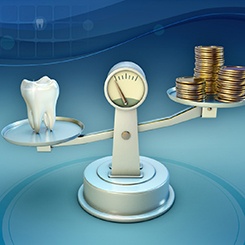Dental Crowns – Rockville, MD
Strengthen & Repair Your Smile
Did you know that your tooth enamel is harder than your bones? Unfortunately, it’s far from destructible. What’s more, unlike your bones, tooth enamel can’t repair itself once it’s been damaged. A weakened or damaged tooth will only continue to get worse over time without proper treatment, putting you at risk of much more serious dental problems in the process. Fortunately, we can strengthen and repair your smile with beautiful, durable, and custom-made dental crowns in Rockville! Read on to learn more about these classic restorations and give us a call when you’re ready to schedule your next appointment.
Why Choose Rockville Family Dentistry For Dental Crowns?
- High-Quality Materials for Durable, Lifelike Results
- Talented Dentist with Over 2 Decades of Experience
- Dental Insurance Welcome & Flexible Financing Available
What Is a Dental Crown?

At first glance, a dental crown looks just like a natural tooth. However, this custom-made “cap” is hollow and designed to fit snugly over an injured or imperfect tooth. It encapsulates the entire portion of the tooth that’s above the gumline, holding it together and strengthening it while simultaneously improving its appearance. Dental crowns can be crafted from a wide variety of materials, but the most popular is dental porcelain, which we can shade to match the color of your teeth for virtually seamless results. Dental crowns are most commonly used to address:
- Broken, fractured, or cracked teeth
- Teeth that have large cavities or fillings
- Teeth that have recently been repaired with a root canal
- Small, mishappen, or cosmetically flawed teeth
- Missing teeth, when paired with a dental implant
The Process of Getting a Dental Crown

Getting a dental crown typically requires two appointments. Once we’ve determined that a dental crown is right for you, we’ll prepare the tooth in question by removing a small amount of enamel. This will ensure that there’s enough room for the dental crown to be placed. Then, impressions are taken and a temporary crown is placed over the tooth. For the next two weeks, those impressions will be used to fabricate your permanent crown. Once we receive it, you’ll return to our office to have your temporary crown removed and replaced with your beautiful, custom-made permanent dental crown.
Benefits of Getting a Dental Crown

Dental crowns are one of the most commonly sought-after dental treatments, and it’s easy to see why! This classic restoration offers numerous benefits, such as:
- No more pain while eating or talking
- Prevents further damage and future infection
- Strengthens the tooth to restore its function
- Beautiful, lifelike results that look just like a natural tooth
- Durable construction that can easily last you many years
- Improves the appearance of the tooth
Understanding the Cost of Dental Crowns

If you have a tooth that’s decayed, broken, cracked, or otherwise damaged, you may benefit from getting a dental crown. However, it’s important to consider the cost of your treatment. We won’t be able to determine the exact cost until we examine your smile in person. In the meantime, here are some things for you to consider.
Factors that Affect the Cost of Dental Crowns

Here are some factors that can affect the cost of your dental crowns:
- Severity of Damage: If your tooth is very damaged, you might need other treatments in addition to your dental crown. For instance, if your tooth is infected, you might need to have a root canal before you have your dental crown placed.
- Materials Used: Dental crowns can be made from a variety of materials, and they are all at different price points. At Rockville Family Dentistry, we use porcelain because of its durability and tooth-like appearance.
Keep in mind that cheaper isn’t better when it comes to dental restorations. It’s very important that you consider the quality of your dental crown. By investing in a quality restoration, it can last for many years down the road.
Does Dental Insurance Cover Dental Crowns?

According to dental insurance companies, dental crowns are a “major procedure,” so they are usually covered by about 50%. We are happy to be in-network with many of the most common providers of dental insurance. We are also able to work with many out-of-network policies. To learn more about dental insurance and what it covers, don’t hesitate to contact us.
Other Options for Making Dental Crowns Affordable

If you don’t have dental insurance, this doesn’t mean that you will be left completely on your own. We work with CareCredit – a third-party financing company that can split the cost of your treatment into manageable monthly installments with little to no interest. To learn more about your financial options, feel free to reach out to one of our friendly team members.
To find out the exact cost of your treatment, schedule an appointment with us. We’re eager to help restore your smile to health.
Dental Crown FAQs

If you have a severely damaged or decayed tooth, you no longer have to extract it to maintain good oral health. Modern dental crowns can both improve your appearance and restore your smile. Although you already know the benefits of the restoration, you may still have a few questions lingering in your mind. Luckily, our team at Rockville Family Dentistry is here to address all of your concerns. For your convenience, we’ve decided to answer some frequently asked questions about dental crowns in Rockville below.
Are Dental Crowns Permanent?
Since dental crowns will eventually need replacement, they’re not considered a permanent restorative solution. However, the process of getting one is irreversible. Dr. Modarres will need to reshape your tooth to ensure the crown fits properly. Once your enamel is altered, it will never grow back, meaning your tooth will always need a restoration for protection moving forward. You can expect your crowned tooth to last anywhere from five to 15 years depending on how well you take care of it. Proper oral hygiene, regular dental visits, and a healthy lifestyle will keep your restoration in excellent shape for years to come.
How Do You Know When a Dental Crown Needs to Be Replaced?
The only way to know for certain whether your dental crown needs replacement is with X-rays or by having it physically examined by Dr. Modarres. Of course, keep an eye out for the following warning signs as they can indicate your restoration is nearing the end of its lifespan:
- Pain – If the underlying tooth is decayed, the crown will need to be removed so the cavity can be treated.
- Instability – You should contact Dr. Modarres right away if your crown feels loose, especially when chewing something sticky.
- Worsened Appearance – A noticeably chipped or discolored crown will need replacement.
- Dark Line at Base – The porcelain on porcelain-fused-to-metal crowns may wear away, revealing the darker metal portion underneath. That indicates the crown may need replacement in the future.
Does It Hurt to Get a Dental Crown?
Before your procedure, Dr. Modarres will numb the tooth in question using a topical anesthetic. While patients are usually numbed during the preparation phase, they’re not for the final crown placement. Of course, Dr. Modarres will ask what your preference is beforehand to ensure you're comfortable during your procedure. After the preparation and placement of your restoration, your tooth may feel sensitive for a few days. Luckily, you can manage your discomfort by taking over-the-counter pain medication as needed.
Can Dental Crowns Be Whitened?
Your crown cannot be whitened in the same way your teeth can, regardless of the material it's made of. That’s mainly because the restoration does not have tiny pores that the bleaching gel can get into to break apart stains. To keep your smile bright and healthy, ask Dr. Modarres about getting teeth whitening before the dental crown is placed. That way, your restoration will be color-matched to the ideal shade of your natural teeth.

